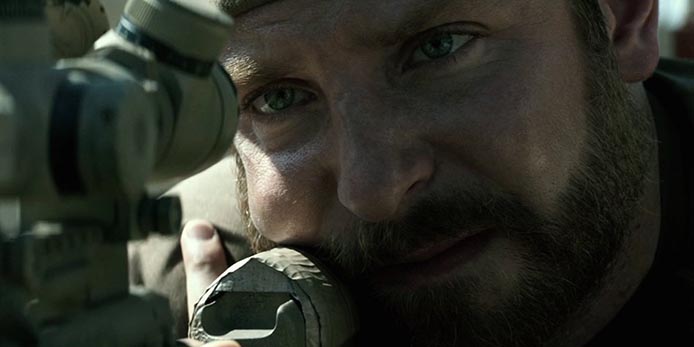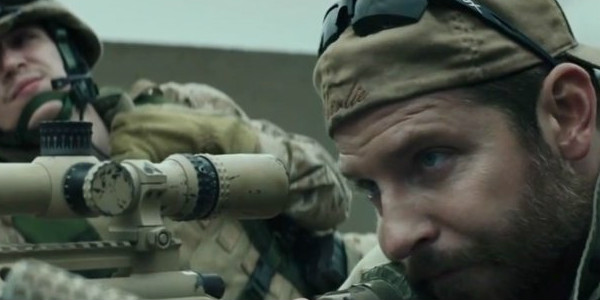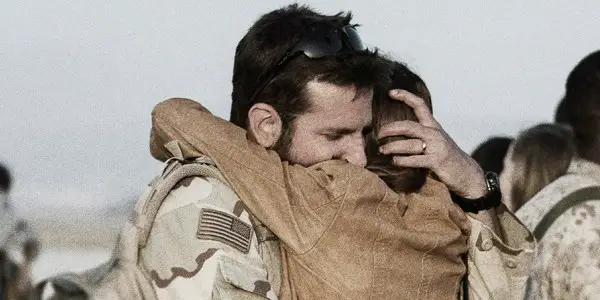AMERICAN SNIPER: A Difficult Portrait

Sam is an English Literature student at the University of…
When the Oscar nominations rolled in on Thursday, perhaps the biggest surprise – other than the snubs for Selma – were the six nods including Best Picture and Best Actor for American Sniper, a movie which few expected to be in the running after getting no attention from the Golden Globes or BAFTAs. There was an even bigger surprise a few days later, when it was announced that the film drew in a stunning $89 million in its opening weekend, which is more than most of last year’s summer blockbusters.
The Iraq War drama snuck up on the awards race out of nowhere, and shattered January box office records beyond all expectation. So is this a return to form for Clint Eastwood after a run of poorly received films? And the chance for Bradley Cooper to fully establish himself as a star leading man? Well, I’m not really sure.

Cooper’s best role yet
American Sniper is the story of Chris Kyle, the most deadly sniper in US history, with over 160 confirmed kills. Cooper, beefed up and displaying a thick Texan accent, portrays the Navy SEAL on four tours of Iraq, along with his life at home in between. At the beginning of the film we see him hunt as a child with his father, who believes that all people are either sheep (the prey), wolves (the predators), or sheepdogs (those who protect the sheep from the wolves). This conversation inspires him to join the Navy SEALS, and soon after, he meets the beautiful Taya (Sienna Miller), who would become his future wife. Then, 9/11 occurs and America is at war. It is at this point, when Kyle is headed off to Iraq, that Cooper gets the chance to shine.
The rise of the Hangover star over the last half-decade is remarkable; once a bit-part actor in mediocre comedies, he has now been nominated for Oscars 3 years running. While I see it as a huge injustice that he was nominated ahead of Jake Gyllenhaal’s stunning performance in Nightcrawler, this is one of the best roles yet for Cooper, portraying a complex and in some ways difficult character with nuance and subtlety – a difficult task in such a macho war thriller. Like Jeremy Renner’s character in The Hurt Locker, the most famous Iraq film before this one, the character hangs in that dangerous balance between wanting to do the right thing in the field of battle but perversely enjoying the thrill of war. We never quite know the effect Kyle’s actions have on his conscience, but we get the sense that despite being called a hero by everyone around him, he wrestles with a doubt that he might not be the legend his fellow servicemen think he is.
No frills direction
Clint Eastwood is famous for his straightforward, no frills, no showing-off style of direction, and it suits the story here. The action scenes are tense, pacey and well-shot, and they show that Iraq can be a fantastic setting for an exciting war film. The dusty, empty cities, eerie calls to prayer and oppressive heat all create a strong atmosphere of tension and dread, which is a modern contrast to the jungles of Vietnam in the 70’s and 80’s.
When Kyle is sniping, we feel the concentration and the sweat, and we are put in his mind, having to rapidly weigh up the same decisions as him. It’s a reminder that, at 84, Eastwood still knows how to direct the hell out of a scene. Like his classic Western Unforgiven, the film uses violence sparingly but shockingly to jolt the viewer out of the desensitized response to violence that so easily accompanies action films. The result is extremely effective.

However, the film does hit a few problems when it moves away from the war zone. Miller‘s performance is good, but for some reason the relationship between her and Kyle seems somewhat flat and forced and there just isn’t much chemistry between them. There is also no sense of a relationship between Kyle and his kids, whose names I don’t think we are even told. Considering the themes of duty and sacrifice, there’s a strange lack of emphasis on what exactly Kyle is sacrificing in order to do his job.
An uncomfortable moral compromise
Overall, though, the nagging problem with American Sniper is that the movie doesn’t know what it wants to say. Our hero probably saved hundreds of soldiers’ lives. But he did it by killing 160 people, from a distance, in a war that many believe was unnecessary. Is that heroic? It’s a divisive question that will bring divisive opinions. But the morality behind what Kyle does and whether those deaths needed to happen needed to be a central theme of the film, and while it is touched on, it feels lacking.
The problem is that Eastwood and screenwriter Jason Hall seem unwilling to either glorify Kyle and the US Army, or to criticise the war and explore its ethics. This is understandable, since to lean too far in either direction would alienate a chunk of the audience who are currently turning up in droves to see it; but the compromise doesn’t quite work. The film is undeniably patriotic, with a macho beer-hunting-cowboy attitude that comes off a little cringeworthy at times – especially to a non-American viewer such as myself (Kyle says America is the greatest country in the world, and I’m not sure if we’re meant to scoff or cheer).

The comparisons many are making to Nation’s Pride, the sniper-based Nazi propaganda film in Inglourious Basterds, are somewhat unfair, but it’s unavoidably true that the Americans are painted as the fundamental good guys, and nearly all the Iraqi characters are pure evil, seen as little more than targets. At the same time, we can see just how much damage the war is causing to both Iraqi civilians and American soldiers. Kyle’s experiences with PTSD are surprisingly moving, as are the horrible deaths of his friends and the brief glimpses of evacuated cities and broken, mourning families.
So was this war worth it, and if so, why? And if it wasn’t, then did Kyle kill all those people for nothing? These are questions the film never fully explores. Maybe Eastwood wanted the audience to decide for themselves, or maybe, like The Hurt Locker, he doesn’t want it to be about Iraq at all, but an examination of how men behave in situations of war. But with a real-life character like Kyle, who is so intertwined in the history and image of the war, the film needed to deliver some kind of message or else it lacks a point.
Conclusion
Overall, American Sniper is a difficult film to make a judgment on. It’s well-acted and well-made, and it has its individual moments. But it also lacks a focus, an edge, or a moment of bravery. The combination of Eastwood and Cooper could, with a bit more guts, have made the quintessential Iraq War film. Instead, in trying to appeal to everyone, it becomes a decent film, but an uncomfortable and unsatisfying one.
Does American Sniper have a clear message about war? Share your thoughts in the comments below!
Does content like this matter to you?
Become a Member and support film journalism. Unlock access to all of Film Inquiry`s great articles. Join a community of like-minded readers who are passionate about cinema - get access to our private members Network, give back to independent filmmakers, and more.
Sam is an English Literature student at the University of Sheffield. He likes film, writing, and writing about film. He didn't think Prometheus was that bad.













